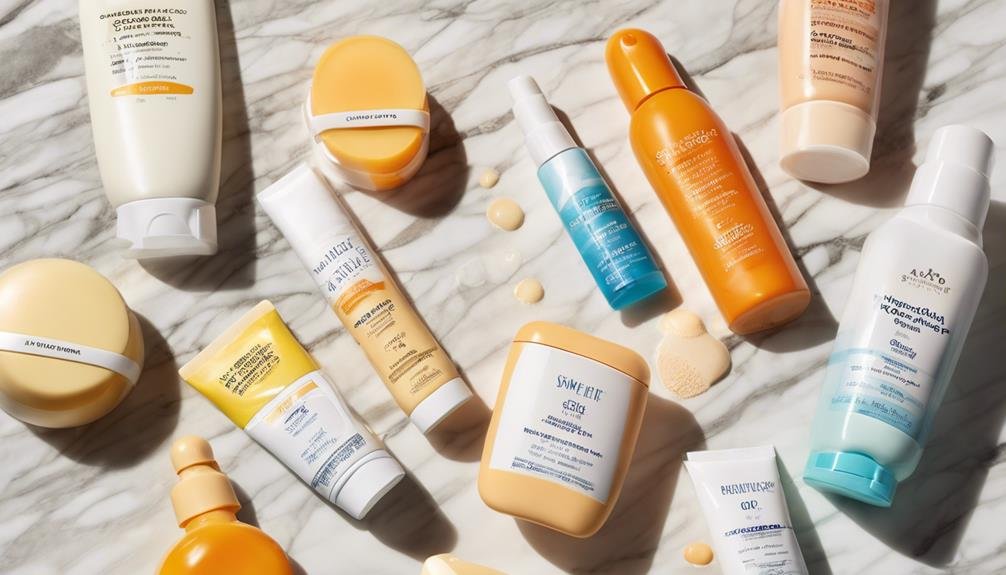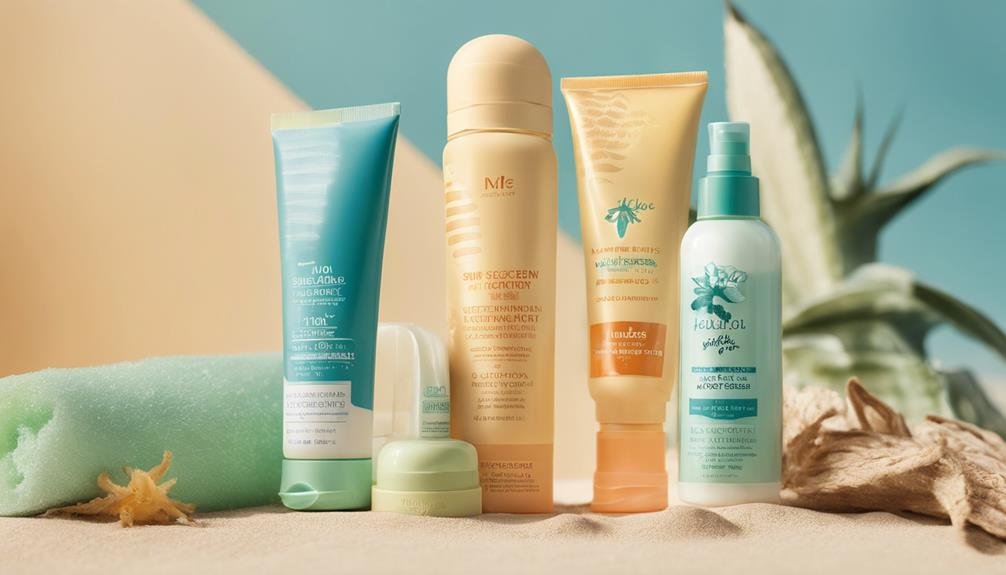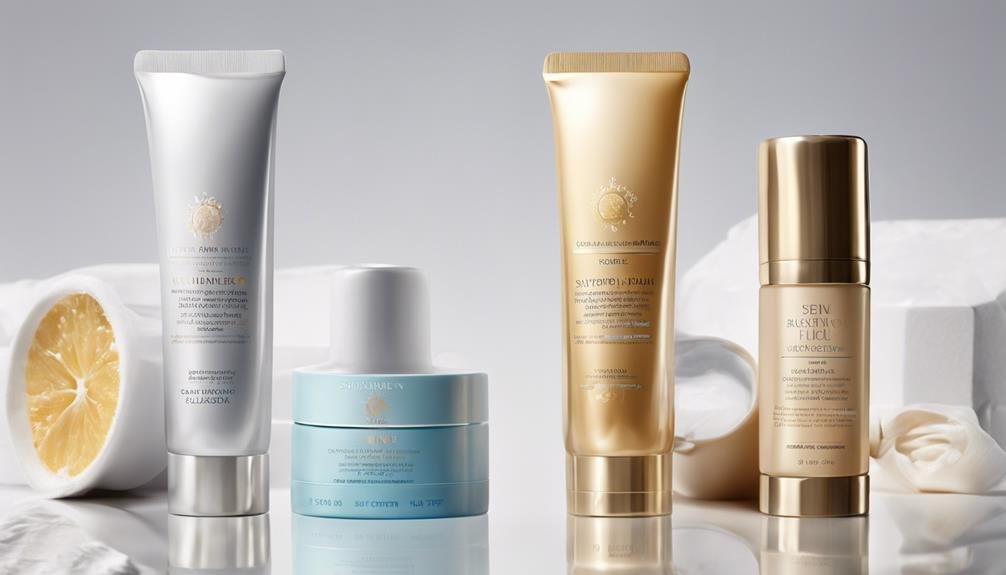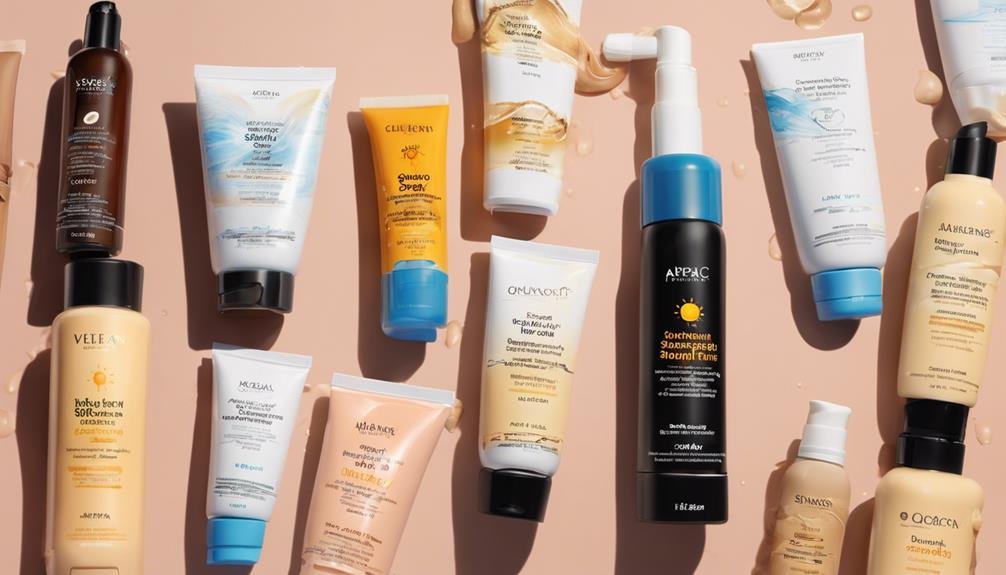Choosing the right sunscreen for your skin type can make all the difference in how well you're protected from the sun's harmful rays. From oily to sensitive skin, each type requires a specific formula to ensure maximum effectiveness and comfort. Understanding which sunscreens cater to your skin's unique needs is the first step towards achieving a healthy and radiant complexion. So, whether you're dealing with acne, dryness, or sensitivity, knowing the top sunscreens for your skin type is key to maintaining optimal skin health.
Key Takeaways
- Choose oil-free or non-comedogenic formulas for oily/acne-prone skin.
- Look for hydrating formulas with hyaluronic acid for dry skin.
- Opt for hypoallergenic, fragrance-free options for sensitive skin.
- Select SPF 30+ zinc oxide/titanium dioxide sunscreens for dark/fair skin.
- Choose water-resistant SPF 30+ for active lifestyles.
Sunscreens for Oily Skin
When dealing with oily skin, selecting the right sunscreen is crucial to maintain a matte finish and prevent clogged pores. Look for sunscreens labeled as "oil-free" or "non-comedogenic" as these are formulated to be lighter and less likely to block pores. Opt for sunscreens with ingredients like zinc oxide or titanium dioxide, which are effective at blocking harmful UV rays without adding extra oil to your skin. Consider choosing a sunscreen with a matte finish to help control shine throughout the day.
It's essential to apply sunscreen generously to ensure you're adequately protected from the sun's damaging rays. Aim for about a nickel-sized amount for your face and a shot glass-sized amount for your body. Reapply every two hours, especially if you're sweating or swimming.
Don't forget to cleanse your skin thoroughly at the end of the day to remove any sunscreen residue and excess oil that may have accumulated.
Sunscreens for Acne-Prone Skin
For individuals with acne-prone skin, choosing the right sunscreen is crucial to protect your skin without exacerbating breakouts. Acne-prone skin is sensitive and requires special attention when selecting skincare products.
When looking for a sunscreen, opt for products labeled as non-comedogenic, meaning they won't clog pores. Additionally, choose sunscreens that are oil-free to prevent excess oil buildup on the skin.
Look for formulas that contain ingredients like zinc oxide or titanium dioxide, which are gentle on acne-prone skin and provide broad-spectrum protection. Remember to apply your sunscreen generously and reapply every two hours, especially if you're spending time outdoors.
Taking these steps can help shield your skin from harmful UV rays without causing further irritation or breakouts.
- Opt for non-comedogenic formulas
- Choose oil-free sunscreens
- Look for zinc oxide or titanium dioxide as active ingredients
Sunscreens for Combination Skin
To effectively protect combination skin from sun damage while addressing its unique needs, selecting the right sunscreen is essential. Combination skin is characterized by having both oily and dry areas, making it crucial to find a sunscreen that balances these opposing skin types. Look for sunscreens labeled as "oil-free" or "non-comedogenic" to prevent clogged pores in the oily areas.
Additionally, opt for a lightweight formula that won't feel heavy on your skin or exacerbate dry patches.
When choosing a sunscreen for combination skin, consider a mineral-based option with ingredients like zinc oxide or titanium dioxide, which are gentle on sensitive areas while effectively protecting against harmful UV rays. These mineral sunscreens also help control oil production in the T-zone without drying out other parts of the face.
Remember to apply sunscreen generously and reapply every two hours, especially if you spend extended time outdoors. By selecting a sunscreen tailored to combination skin, you can ensure your skin stays protected and balanced throughout the day.
Sunscreens for Dry Skin
Wondering how to best shield your dry skin from the sun's harmful rays? Dry skin requires special attention when it comes to choosing the right sunscreen. Here are some key points to consider:
- Look for Hydrating Formulas: Opt for sunscreens that contain moisturizing ingredients like hyaluronic acid, glycerin, or ceramides to help nourish and hydrate your dry skin while providing sun protection.
- Choose Cream or Lotion Formulations: Creams or lotions tend to be more hydrating and are better suited for dry skin compared to gels or sprays. These formulations create a barrier that locks in moisture and prevents further dehydration.
- Broad Spectrum Protection: Ensure the sunscreen offers broad-spectrum protection against both UVA and UVB rays. Dry skin is more prone to premature aging, so adequate protection is crucial in maintaining skin health.
Sunscreens for Sensitive Skin
Dry skin isn't the only skin type that requires special attention when it comes to choosing the right sunscreen. If you have sensitive skin, you know the struggle of finding a sunscreen that won't cause irritation or breakouts. Look for sunscreens labeled "hypoallergenic," "fragrance-free," or "for sensitive skin" to minimize the risk of adverse reactions.
Opt for mineral sunscreens containing zinc oxide or titanium dioxide, as they're less likely to cause irritation compared to chemical sunscreens. These ingredients provide broad-spectrum protection without clogging pores or causing redness. Consider trying a physical sunscreen with a gentle formula that soothes and protects your sensitive skin.
Remember to perform a patch test before full application to ensure compatibility with your skin. Protecting your skin from the sun's harmful rays is crucial, especially for sensitive skin, so choose a sunscreen that prioritizes both protection and gentleness.
Sunscreens for Normal Skin
For those with normal skin, selecting the right sunscreen is crucial for maintaining healthy skin and preventing sun damage. Normal skin types have the advantage of not being overly oily or dry, making it easier to find a sunscreen that suits your needs.
When choosing a sunscreen for normal skin, consider the following:
- Broad-spectrum protection: Opt for a sunscreen that protects against both UVA and UVB rays to shield your skin from sun damage effectively.
- Lightweight formula: Look for sunscreens with a lightweight, non-greasy formula that won't feel heavy or clog your pores, ideal for normal skin that doesn't require extra hydration or oil control.
- Added antioxidants: Consider sunscreens with added antioxidants like vitamin C or green tea extract to provide an extra layer of protection against free radicals and environmental stressors.
Sunscreens for Mature Skin
As skin matures, its needs change, requiring specific attention and care to maintain its health and vitality. When choosing a sunscreen for mature skin, opt for products that not only protect against harmful UV rays but also address common concerns such as fine lines, wrinkles, and uneven skin tone. Look for sunscreens with ingredients like antioxidants such as vitamin C and E, hyaluronic acid for hydration, and peptides to boost collagen production.
It's essential to select a broad-spectrum sunscreen with an SPF of at least 30 to shield your mature skin from both UVA and UVB rays. Consider lightweight formulas that won't feel heavy or clog pores, especially if you have mature skin prone to dryness or sensitivity. Mineral sunscreens with ingredients like zinc oxide or titanium dioxide can be gentle on aging skin while providing effective sun protection.
Remember to reapply your sunscreen every two hours, especially when spending extended periods outdoors, to safeguard your skin and maintain a youthful complexion.
Sunscreens for Aging Skin
Enhancing your skincare routine with the right sunscreen is crucial for addressing the specific needs of aging skin. As you age, your skin becomes more susceptible to damage from the sun's harmful rays, leading to wrinkles, fine lines, and age spots. To combat these signs of aging effectively, consider the following tips:
- Look for sunscreens with a high SPF: Opt for a broad-spectrum sunscreen with an SPF of 30 or higher to ensure protection against both UVA and UVB rays.
- Choose sunscreens with added anti-aging ingredients: Seek out sunscreens that contain antioxidants like vitamin C and E, as well as hyaluronic acid and niacinamide to help combat signs of aging.
- Consider tinted sunscreens: Tinted sunscreens not only provide sun protection but also offer a light coverage to even out skin tone and provide a youthful glow.
Sunscreens for Dark Skin Tones
When it comes to choosing sunscreens for dark skin tones, it's essential to select products that cater to the specific needs of melanin-rich skin. Contrary to common misconceptions, individuals with darker skin tones are still susceptible to sun damage and skin cancer. Opt for sunscreens that offer broad-spectrum protection with an SPF of at least 30. Look for products that contain ingredients like zinc oxide or titanium dioxide, as they're less likely to leave a white cast on darker skin.
Consider lightweight formulations that won't feel heavy or greasy on your skin. Chemical sunscreens with ingredients such as avobenzone, octinoxate, or oxybenzone are suitable options for dark skin tones. Remember to reapply sunscreen every two hours, especially if you're swimming or sweating.
Some recommended sunscreens for dark skin tones include Neutrogena Ultra Sheer Dry-Touch Sunscreen and CeraVe Hydrating Mineral Sunscreen. These products are designed to provide effective sun protection without compromising the natural beauty of your skin.
Sunscreens for Fair Skin Tones
For fair skin tones, selecting the right sunscreen is crucial to protecting your skin from harmful UV rays. Fair skin is more susceptible to sunburn and sun damage, making it essential to choose a sunscreen that offers high protection. Here are some tips to help you find the best sunscreen for your fair skin:
- Look for a broad-spectrum sunscreen with a high SPF of 30 or higher to shield your skin from both UVA and UVB rays.
- Opt for a physical sunscreen containing ingredients like zinc oxide or titanium dioxide, which create a protective barrier on your skin.
- Consider choosing a water-resistant sunscreen to ensure long-lasting protection, especially if you'll be spending time outdoors or near water.
Sunscreens for Active Lifestyles
Selecting the right sunscreen for an active lifestyle is crucial to ensure your skin remains protected while you engage in various physical activities. Look for sunscreens labeled as water-resistant and sweat-resistant to provide long-lasting protection even during intense workouts or outdoor adventures. Opt for a broad-spectrum sunscreen with an SPF of 30 or higher to shield your skin from both UVA and UVB rays.
When choosing a sunscreen for your active lifestyle, consider lightweight and non-greasy formulas that won't weigh you down or cause discomfort during movement. Additionally, look for sunscreens that are quick-absorbing to prevent them from running into your eyes when you sweat.
It's also essential to reapply sunscreen every two hours, or more frequently if you're swimming or sweating heavily. Consider using a sunscreen spray for convenient reapplication on-the-go.
Sunscreens for Everyday Wear
To ensure optimal protection for your skin in your day-to-day activities, it's essential to choose a sunscreen designed for everyday wear that offers both comfort and effectiveness. When selecting a sunscreen for everyday use, consider the following:
- Broad Spectrum Protection: Look for a sunscreen that provides broad-spectrum protection against both UVA and UVB rays to shield your skin from potential damage and premature aging.
- Lightweight Formulation: Opt for a lightweight, non-greasy sunscreen that blends easily into your skin without leaving a heavy or sticky residue, ensuring comfortable wear throughout the day.
- Moisturizing Ingredients: Choose a sunscreen that contains moisturizing elements like hyaluronic acid or glycerin to keep your skin hydrated and nourished, preventing dryness and maintaining a healthy complexion.
Frequently Asked Questions
Can I Apply Sunscreen Over Makeup?
Yes, you can apply sunscreen over makeup for added protection. It's recommended to use a spray or powder sunscreen for easy reapplication. Simply mist or brush it on throughout the day to keep your skin shielded.
Should I Wear Sunscreen Indoors?
Yes, you should wear sunscreen indoors. UV rays can penetrate windows and lead to skin damage. Daily sunscreen use, even indoors, helps prevent premature aging and lowers skin cancer risk. Choose a broad-spectrum SPF 30 or higher for protection.
How Often Should Sunscreen Be Reapplied?
You should reapply sunscreen every two hours, especially if you're outdoors or swimming, to maintain its effectiveness. Remember to apply a sufficient amount and don't forget overlooked areas like ears, neck, and hands.
Is It Safe to Use Expired Sunscreen?
Using expired sunscreen is not recommended. The effectiveness diminishes, leaving your skin vulnerable to harmful UV rays. Protect yourself by checking expiration dates and replacing old products. Your skin deserves fresh protection.
Can Sunscreen Cause Skin Allergies?
Yes, sunscreen can cause skin allergies due to ingredients like fragrances or preservatives. Always patch test new products and opt for mineral-based sunscreens if you have sensitive skin. Consult a dermatologist for personalized recommendations.
Conclusion
In conclusion, finding the right sunscreen for your skin type is essential for protection and comfort. Remember to choose oil-free, non-comedogenic formulas for oily skin, hydrating creams for dry skin, and hypoallergenic options for sensitive skin. Whether you have acne-prone, combination, dark, or fair skin tones, there is a sunscreen out there for you. So, no matter what your skin type is, make sure to reapply every two hours for continuous UV protection and enjoy the sun safely.







